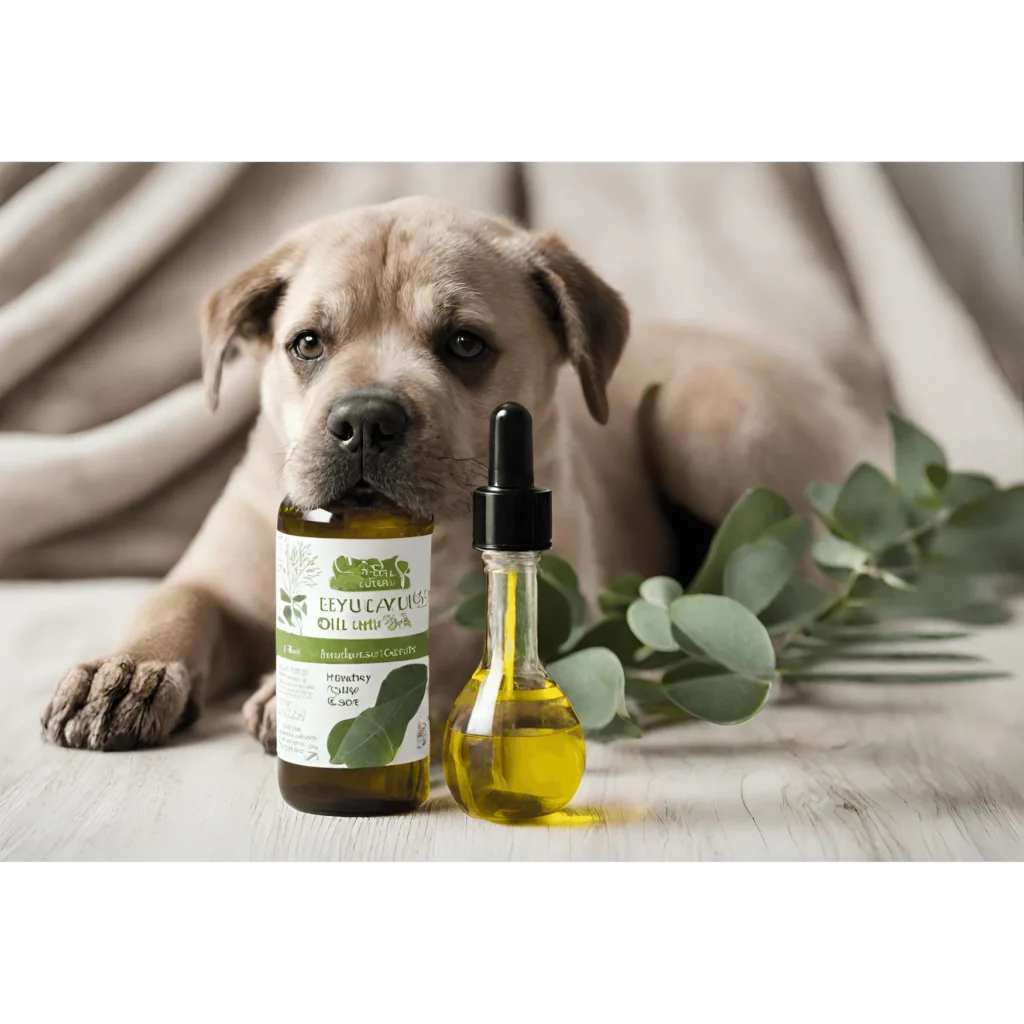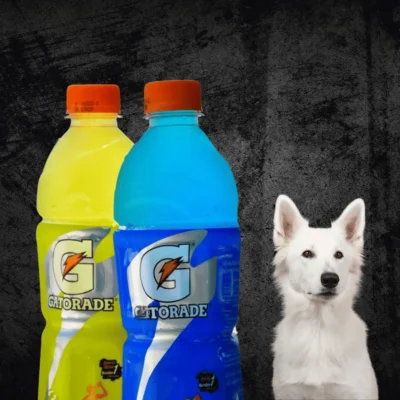Eucalyptus oil, rooted in Australian Aboriginal herbal practices, gained global attention in 1788. It has become increasingly popular for its various household uses, ranging from aromatherapy to cleaning. However, for dog owners, a crucial question arises: Is eucalyptus oil safe for our canine companions? Sometimes it’s a yes, and at other times, it’s a no—depends on the situation!
In this article, we’ll explore whether eucalyptus oil is safe for your canine companion. Uncovering both the potential benefits and risks associated with eucalyptus oil, we’ll also learn the necessary precautions to ensure the well-being of your furry friends.
Here are the topics we’re going to discuss in this blog post:
- What is eucalyptus oil?
- Is eucalyptus oil safe for dogs?
- Eucalyptus oil benefits for dogs
- Pet products that contain eucalyptus oil
- Is it safe to use eucalyptus oil for treating fleas in dogs?
- Eucalyptus oil risks for dogs
- Eucalyptus Oil and Dogs: Important Precautions to Keep in Mind
What is Eucalyptus Oil?

Eucalyptus oil is a natural essential oil that is derived from the leaves of the eucalyptus tree, specifically the Eucalyptus globulus species. The eucalyptus tree is native to Australia, but it is also found in other parts of the world.
The leaves of the eucalyptus, usually Eucalyptus globulus but with other varieties used for essential oils as well, are chopped and placed into a distilling apparatus. Steam is then passed through the leaves, collecting the oil in the process. When the steam reaches the top of the apparatus, it encounters a cold surface where it condenses back into liquid water and oil. These components are collected and left to separate; like most oils, the essential oil floats on the surface of the water, making the separation process easy.
The primary medicinal compound in Eucalyptus is cineole, commonly known as eucalyptol. This compound is responsible for the majority of the respiratory benefits commonly associated with eucalyptus.
Is Eucalyptus Oil Safe for Dogs?

Whether eucalyptus oil is safe for dogs depends on how it is used. It’s a bit of a mix—sometimes yes, sometimes no. While we might find the smell of eucalyptus pleasant, it can be too strong and overwhelming for our furry friends. Dogs have a super-sensitive sense of smell, so what’s okay for us might not be so great for them.
But don’t worry, blue gum can be helpful for your dogs! It’s a fantastic natural insect repellent, keeping those pesky bugs away from your pets. It’s also great for protecting your dogs from mosquitoes.
The ASPCA (American Society for the Prevention of Cruelty to Animals) lists eucalyptus as toxic to dogs. Ingesting eucalyptus oil can lead to symptoms such as vomiting, diarrhea, excessive drooling, lethargy, and, in severe cases, difficulty breathing.
It’s important to be cautious when diffusing eucalyptus oil around dogs. To ensure the safety of your furry friend, it’s best to keep your dog away from the diffuser, preferably in another room.
Benefits of Eucalyptus Oil for Dogs:

Eucalyptus oil, when used cautiously and in appropriate amounts, can offer certain advantages for dogs:
Respiratory Relief:
Eucalyptus oil is believed to provide respiratory relief for dogs due to its potential decongestant properties. The oil contains compounds such as cineole, which has been traditionally used to help ease respiratory issues.
Genus eucalyptus is thought to have natural decongestant properties, which means it may help reduce mucus and open up the airways. This can be particularly beneficial for dogs suffering from respiratory conditions like colds, coughs, or congestion.
Insect Repellent:
Eucalyptus oil has natural insect-repelling properties. Eucalyptus oil contains compounds like citronellal and limonene, which have been shown to repel some insects, including mosquitoes and flies. These properties might also have some effect on fleas and ticks.
It is important to talk to your veterinarian about the best flea and tick control options for your dog. They can consider your dog’s age, breed, health, and lifestyle to recommend the best product.
Anti-Inflammatory Properties:
Eucalyptus oil contains compounds with anti-inflammatory properties. When diluted and applied topically, it may help soothe skin irritations or hot spots in dogs. Diluted eucalyptus oil can be applied topically to help reduce inflammation associated with skin irritations, bug bites, or minor wounds. Mix a few drops of eucalyptus oil with a carrier oil and gently apply it to the affected area.
For dogs with hot spots or inflamed skin, a diluted eucalyptus oil solution can be applied to soothe the affected area. Always ensure proper dilution to prevent skin irritation.
Joint and Muscle Support:
Eucalyptus oil is thought to offer potential support for joint and muscle issues in dogs, primarily due to its anti-inflammatory and analgesic (pain-relieving) properties.
Dilute the eucalyptus oil with the carrier oil and massage the mixture onto the dog’s joints or muscles. This can provide relief for stiffness or soreness. Pay attention to the amount used and the dog’s reaction, ensuring proper dilution to avoid skin irritation.
Pet Products That Restrain Eucalyptus Oil:
While there isn’t solid evidence supporting the use of eucalyptus oil for pets, it is a common ingredient in many pet products. Some incorporate it to freshen things up, while others include it for its potential antibacterial, anti-inflammatory, and bug-repelling qualities. Pet shampoos and grooming products, for instance, may contain eucalyptus oil for its pleasant scent and possible insect-repelling properties. Additionally, some flea and tick collars for dogs may use eucalyptus oil as a natural repellent.
Wipes designed for pets, especially those intended for cleaning paws or fur, might include eucalyptus oil for its refreshing and deodorizing properties. Pet sprays, such as those for odor control or calming effects, could also incorporate eucalyptus oil. Although these products typically contain only a small amount of eucalyptus oil and are usually diluted, there remains a potential risk to your pet.
Here’s the catch: we don’t know precisely how much eucalyptus oil can be harmful. Each dog is unique, and a dog’s tolerance to eucalyptus may change over time. For instance, if your dog develops liver or skin issues, their sensitivity could increase. It’s important to note that some ‘natural’ flea products with essential oils have reportedly caused side effects and even death, according to cases reported to ASPCA Animal Poison Control.
Monitor your dog for any signs of discomfort or adverse reactions when using products containing eucalyptus oil. Discontinue use if any issues arise.
Is it safe to use eucalyptus oil for treating fleas in dogs?

Yes, essential oils can help eliminate fleas in dogs, providing a safe alternative to chemical treatments. Adding eucalyptus oil to shampoo and using it on dogs can effectively free them from fleas and ticks. Apply the diluted eucalyptus oil to specific areas of your dog’s coat where fleas are likely to gather, such as around the neck, back, and legs. Avoid sensitive areas like the face, nose, eyes, and genitals.
Linalool, a crucial compound found in essential oils, plays a key role in rapidly killing fleas. Since lavender oil has a high linalool content, it is recommended to combine eucalyptus oil with lavender oil and blend them with a carrier oil. Applying this mixture to dogs helps get rid of fleas. This natural approach ensures a user-friendly and effective solution for treating fleas in dogs.
Risks of Eucalyptus Oil for Dogs:

While eucalyptus oil can offer certain perks for dogs when used properly, there are also potential pitfalls associated with its use. It’s crucial to be aware of these risks:
1. Toxicity Concerns:
Ingesting undiluted eucalyptus oil or consuming large amounts of a diluted solution can be toxic to dogs. Even small quantities can cause adverse reactions, so it’s important to prevent your dog from licking or ingesting eucalyptus oil applied to the skin or fur.
If a dog ingests eucalyptus oil, symptoms of toxicity may include drooling, vomiting, diarrhea, lethargy, weakness, difficulty walking, and, in severe cases, seizures or respiratory distress. If you suspect your dog has ingested eucalyptus oil, seek immediate veterinary attention.
2. Skin Sensitivity:
Applying undiluted eucalyptus oil directly to a dog’s skin can irritate. Always dilute eucalyptus oil before applying it to your dog’s skin. Undiluted eucalyptus oil can be too strong and may irritate. Mix it with a pet-safe carrier oil, such as coconut or olive oil, using recommended dilution ratios.`
Monitor your dog closely after applying eucalyptus oil. If you notice excessive scratching, redness, or any signs of discomfort, wash off the oil immediately and consult with your veterinarian.
3. Respiratory Issues:
Inhaling concentrated eucalyptus oil vapours can be harmful to dogs, particularly those with respiratory issues. Diffusing the oil in an enclosed space can lead to breathing difficulties. Ensure proper ventilation and, if necessary, choose milder alternatives for aromatherapy around dogs.
Eucalyptus Oil and Dogs: Important Precautions to Keep in Mind

Using eucalyptus oil with dogs requires careful consideration and adherence to important precautions to ensure their safety. Remember these important points:
- Never use concentrated eucalyptus oil; it should be properly diluted for safe application.
- Never apply eucalyptus oil or products to broken skin, as this can increase the risk of irritation.
- Refrain from using eucalyptus oil, regardless of dilution, on small dogs and puppies due to their heightened sensitivity.
- Avoid using eucalyptus oil on your dog if your cat could come into contact with it, as cats can be particularly sensitive to certain essential oils.
- Exercise caution when using eucalyptus oil in a diffuser. If used, ensure it is in a separate room from your pets to prevent overexposure.
- Keep a close eye on your dog after using eucalyptus oil. If you observe signs of discomfort, irritation, excessive scratching, or any adverse reactions, discontinue use and consult with your veterinarian.
Conclusion:
In summary, while eucalyptus oil has potential benefits for dogs, including respiratory relief and insect repellence, its use requires careful consideration of associated risks. Proper dilution is crucial, and caution should be exercised, especially concerning skin sensitivity and respiratory distress. Pet owners should avoid using eucalyptus oil on small dogs, puppies, or in proximity to cats.
Pet products containing spotted gum may have varied formulations, and their safety depends on proper dilution and individual dog sensitivities. Consulting a veterinarian is recommended, particularly for dogs with pre-existing health conditions.
Additionally, eucalyptus oil can be a valuable tool for specific purposes in canine care when used judiciously and under professional guidance. Prioritizing safety and monitoring for adverse reactions are essential aspects of incorporating eucalyptus oil into your dog’s wellness routine.
FAQs:
Is eucalyptus oil safe for dogs?
Eucalyptus oil can be safe for dogs when used cautiously and in moderation. However, it’s essential to consider the proper dilution, application methods, and individual sensitivities.
Is eucalyptus oil effective as an insect repellent for dogs?
Yes, eucalyptus oil has natural insect-repelling properties that can help deter mosquitoes, flies, fleas, and ticks. It can be applied topically or used in pet products designed for insect control.
What are the risks of using eucalyptus oil on dogs?
There are many risks to applying eucalyptus oil to dogs:
- Toxicity
- Skin irritation
- Respiratory Issues
Is it safe to diffuse eucalyptus oil around dogs?
While diffusing is generally less of a risk than direct application, it’s still advisable to avoid diffusing eucalyptus oil in areas where your dog spends time.
What are the benefits of using eucalyptus oil for dogs?
Eucalyptus oil may offer benefits such as respiratory relief, insect-repellent properties, and anti-inflammatory support for dogs. When used appropriately, it can be a natural solution for specific canine issues.












